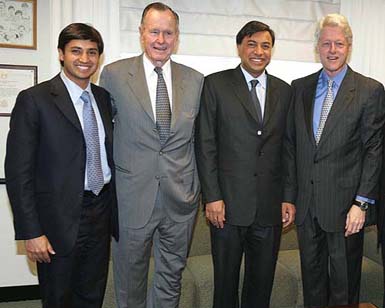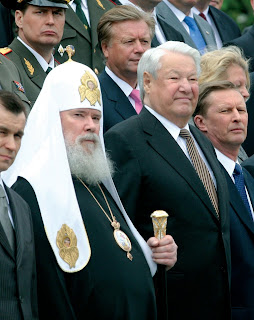As long as there is property, inheritance, money, ego and ambition, business familie s
s  will continue to split. Given their size and the profile that they enjoy in public imagination, the Ambani brothers have been getting more than their fair share of publicity and gossip. If one looks at the whole issue objectively, there is no doubt that stakeholders have benefitted immensely after the two brothers agreed to a split arranged by ICICI Bank boss K. V. Kamath and morally presided over by the matriarch of the family Kokilaben Ambani; the widow of Dhirubhai. Around the time the two brothers split, the Reliance Industries share was hovering in the range of Rs.700 or so for a while. There were many so-called pundits who sniggered when it was suggested that a split between the two and a clear division of functions and ‘assets’ will lead to unlocking of shareholder value. As usual, the pundits were wrong and the Reliance share that was worth about Rs.700 in 2005 is worth more than three times that figure!
will continue to split. Given their size and the profile that they enjoy in public imagination, the Ambani brothers have been getting more than their fair share of publicity and gossip. If one looks at the whole issue objectively, there is no doubt that stakeholders have benefitted immensely after the two brothers agreed to a split arranged by ICICI Bank boss K. V. Kamath and morally presided over by the matriarch of the family Kokilaben Ambani; the widow of Dhirubhai. Around the time the two brothers split, the Reliance Industries share was hovering in the range of Rs.700 or so for a while. There were many so-called pundits who sniggered when it was suggested that a split between the two and a clear division of functions and ‘assets’ will lead to unlocking of shareholder value. As usual, the pundits were wrong and the Reliance share that was worth about Rs.700 in 2005 is worth more than three times that figure!
No wo nder, the Ambani brothers, despite their personal feuds, have retained the
nder, the Ambani brothers, despite their personal feuds, have retained the  loyalty of the stock market investors in the country and beyond. Something totally different seems tobe happening with the proposed split in the Bajaj family; a controversy that has been raging for many years now. Just recently, after many battles with Sishir Bajaj that have been made public, Rahul Bajaj announced a separation offunctions and responsibilities between even his own sons Sanjeev and Rajeev Bajaj. In effect, the Bajaj patriarch announced that one son will lead the automobile business while the other one will control the financial services business. Despite this seemingly pragmatic separation imposed well on time by the elder Bajaj, investors in the market have not taken well to the split, nor do they see any unlocking of value in the near future as Sanjeev and Rajeev go their own separate ways.
loyalty of the stock market investors in the country and beyond. Something totally different seems tobe happening with the proposed split in the Bajaj family; a controversy that has been raging for many years now. Just recently, after many battles with Sishir Bajaj that have been made public, Rahul Bajaj announced a separation offunctions and responsibilities between even his own sons Sanjeev and Rajeev Bajaj. In effect, the Bajaj patriarch announced that one son will lead the automobile business while the other one will control the financial services business. Despite this seemingly pragmatic separation imposed well on time by the elder Bajaj, investors in the market have not taken well to the split, nor do they see any unlocking of value in the near future as Sanjeev and Rajeev go their own separate ways.
In fact, the share price of Bajaj Auto has dropped after the split was announced re cently! Ranbaxy is yet another inheritance that has seen bruising and controversial battles between inheritors. This is a battle in which uncle is pitted against nephew; with the genesis of the battle going back to the early 1990s, when Dr. Parvinder Singh, who spearheaded the rise of Ranbaxy, orchestrated the ouster of his own father Bhai Mohan Singh from the company, when the latter opposed Dr. Singh’s plans to take Ranbaxy global. Bhai Mohan Singh bequeathed many of his assets to the other son Bhai Analjit Singh, the uncle of Malvinder Singh, who now heads Ranbaxy. Indeed, Indian business families have had quite serious split personalities!
cently! Ranbaxy is yet another inheritance that has seen bruising and controversial battles between inheritors. This is a battle in which uncle is pitted against nephew; with the genesis of the battle going back to the early 1990s, when Dr. Parvinder Singh, who spearheaded the rise of Ranbaxy, orchestrated the ouster of his own father Bhai Mohan Singh from the company, when the latter opposed Dr. Singh’s plans to take Ranbaxy global. Bhai Mohan Singh bequeathed many of his assets to the other son Bhai Analjit Singh, the uncle of Malvinder Singh, who now heads Ranbaxy. Indeed, Indian business families have had quite serious split personalities!
For Complete IIPM Article, Click on IIPM Article
 s
s  will continue to split. Given their size and the profile that they enjoy in public imagination, the Ambani brothers have been getting more than their fair share of publicity and gossip. If one looks at the whole issue objectively, there is no doubt that stakeholders have benefitted immensely after the two brothers agreed to a split arranged by ICICI Bank boss K. V. Kamath and morally presided over by the matriarch of the family Kokilaben Ambani; the widow of Dhirubhai. Around the time the two brothers split, the Reliance Industries share was hovering in the range of Rs.700 or so for a while. There were many so-called pundits who sniggered when it was suggested that a split between the two and a clear division of functions and ‘assets’ will lead to unlocking of shareholder value. As usual, the pundits were wrong and the Reliance share that was worth about Rs.700 in 2005 is worth more than three times that figure!
will continue to split. Given their size and the profile that they enjoy in public imagination, the Ambani brothers have been getting more than their fair share of publicity and gossip. If one looks at the whole issue objectively, there is no doubt that stakeholders have benefitted immensely after the two brothers agreed to a split arranged by ICICI Bank boss K. V. Kamath and morally presided over by the matriarch of the family Kokilaben Ambani; the widow of Dhirubhai. Around the time the two brothers split, the Reliance Industries share was hovering in the range of Rs.700 or so for a while. There were many so-called pundits who sniggered when it was suggested that a split between the two and a clear division of functions and ‘assets’ will lead to unlocking of shareholder value. As usual, the pundits were wrong and the Reliance share that was worth about Rs.700 in 2005 is worth more than three times that figure!No wo
 nder, the Ambani brothers, despite their personal feuds, have retained the
nder, the Ambani brothers, despite their personal feuds, have retained the  loyalty of the stock market investors in the country and beyond. Something totally different seems tobe happening with the proposed split in the Bajaj family; a controversy that has been raging for many years now. Just recently, after many battles with Sishir Bajaj that have been made public, Rahul Bajaj announced a separation offunctions and responsibilities between even his own sons Sanjeev and Rajeev Bajaj. In effect, the Bajaj patriarch announced that one son will lead the automobile business while the other one will control the financial services business. Despite this seemingly pragmatic separation imposed well on time by the elder Bajaj, investors in the market have not taken well to the split, nor do they see any unlocking of value in the near future as Sanjeev and Rajeev go their own separate ways.
loyalty of the stock market investors in the country and beyond. Something totally different seems tobe happening with the proposed split in the Bajaj family; a controversy that has been raging for many years now. Just recently, after many battles with Sishir Bajaj that have been made public, Rahul Bajaj announced a separation offunctions and responsibilities between even his own sons Sanjeev and Rajeev Bajaj. In effect, the Bajaj patriarch announced that one son will lead the automobile business while the other one will control the financial services business. Despite this seemingly pragmatic separation imposed well on time by the elder Bajaj, investors in the market have not taken well to the split, nor do they see any unlocking of value in the near future as Sanjeev and Rajeev go their own separate ways.In fact, the share price of Bajaj Auto has dropped after the split was announced re
 cently! Ranbaxy is yet another inheritance that has seen bruising and controversial battles between inheritors. This is a battle in which uncle is pitted against nephew; with the genesis of the battle going back to the early 1990s, when Dr. Parvinder Singh, who spearheaded the rise of Ranbaxy, orchestrated the ouster of his own father Bhai Mohan Singh from the company, when the latter opposed Dr. Singh’s plans to take Ranbaxy global. Bhai Mohan Singh bequeathed many of his assets to the other son Bhai Analjit Singh, the uncle of Malvinder Singh, who now heads Ranbaxy. Indeed, Indian business families have had quite serious split personalities!
cently! Ranbaxy is yet another inheritance that has seen bruising and controversial battles between inheritors. This is a battle in which uncle is pitted against nephew; with the genesis of the battle going back to the early 1990s, when Dr. Parvinder Singh, who spearheaded the rise of Ranbaxy, orchestrated the ouster of his own father Bhai Mohan Singh from the company, when the latter opposed Dr. Singh’s plans to take Ranbaxy global. Bhai Mohan Singh bequeathed many of his assets to the other son Bhai Analjit Singh, the uncle of Malvinder Singh, who now heads Ranbaxy. Indeed, Indian business families have had quite serious split personalities!For Complete IIPM Article, Click on IIPM Article
Source : IIPM Editorial, 2007
An IIPM and Professor Arindam Chaudhuri (Renowned Management Guru and Economist) Initiative




 The IT and the ITeS sectors accounted for 48% of the total deals. The investment figure is likely to go beyond $10 billion by 2010. Motivated by factors like greater profitability, cost advantage and a moderate regulatory atmosphere promoted by the government, a total of 48 overseas deals were inked in 2006-07. Also, many small and mid-sized deals contributed somewhere between $20-60 million. A joint study by FICCI & Ernst and Young predict better activity in this sector.
The IT and the ITeS sectors accounted for 48% of the total deals. The investment figure is likely to go beyond $10 billion by 2010. Motivated by factors like greater profitability, cost advantage and a moderate regulatory atmosphere promoted by the government, a total of 48 overseas deals were inked in 2006-07. Also, many small and mid-sized deals contributed somewhere between $20-60 million. A joint study by FICCI & Ernst and Young predict better activity in this sector.




















 weapons were unleashed, deliberately or accidentally, and no full-scale war of the kind that ravaged post-communist Yugoslavia broke out between Russia and any of its neighbors, although several of them were locked in internal or regional conflict in which Russia’s hand was visible. The tasks that faced Yeltsin when he attained power in 1991 were monumental. At several crucial moments, he established himself as a person who could rise to the challenges of transforming Russia from a dictatorship into a democracy, from a planned economy into a free market, and from an empire into a medium ranked power. In 1992, as the emerging Russian Federation teetered on the brink of economic and monetary collapse, he opted for radical reform, prompting a backlash from vested interest groups. In the years that followed, he would tilt toward liberal economics whenever he felt powerful enough to do so.
weapons were unleashed, deliberately or accidentally, and no full-scale war of the kind that ravaged post-communist Yugoslavia broke out between Russia and any of its neighbors, although several of them were locked in internal or regional conflict in which Russia’s hand was visible. The tasks that faced Yeltsin when he attained power in 1991 were monumental. At several crucial moments, he established himself as a person who could rise to the challenges of transforming Russia from a dictatorship into a democracy, from a planned economy into a free market, and from an empire into a medium ranked power. In 1992, as the emerging Russian Federation teetered on the brink of economic and monetary collapse, he opted for radical reform, prompting a backlash from vested interest groups. In the years that followed, he would tilt toward liberal economics whenever he felt powerful enough to do so.
 of Africa, gift ed the region with blood and bullets that has ever since kept the countries in the region perpetually at odds against each other. The result of such quixoticism has been that, Eritrea and Ethiopia have been at war against each other while the Somali population has been splattered across different countries fuelling tension and war. The legacy doesn’t end here rather the political bigotry that has led to creation of artificial international boundaries have led to severe repercussions elsewhere as well. The 38th parallel that divided the Korean Peninsula into warring North and South was the creation of the infamous Korean War. Even before the ceasefire in 1953, the line separated the Soviet and the American controlled sector after the World War-II.
of Africa, gift ed the region with blood and bullets that has ever since kept the countries in the region perpetually at odds against each other. The result of such quixoticism has been that, Eritrea and Ethiopia have been at war against each other while the Somali population has been splattered across different countries fuelling tension and war. The legacy doesn’t end here rather the political bigotry that has led to creation of artificial international boundaries have led to severe repercussions elsewhere as well. The 38th parallel that divided the Korean Peninsula into warring North and South was the creation of the infamous Korean War. Even before the ceasefire in 1953, the line separated the Soviet and the American controlled sector after the World War-II.





